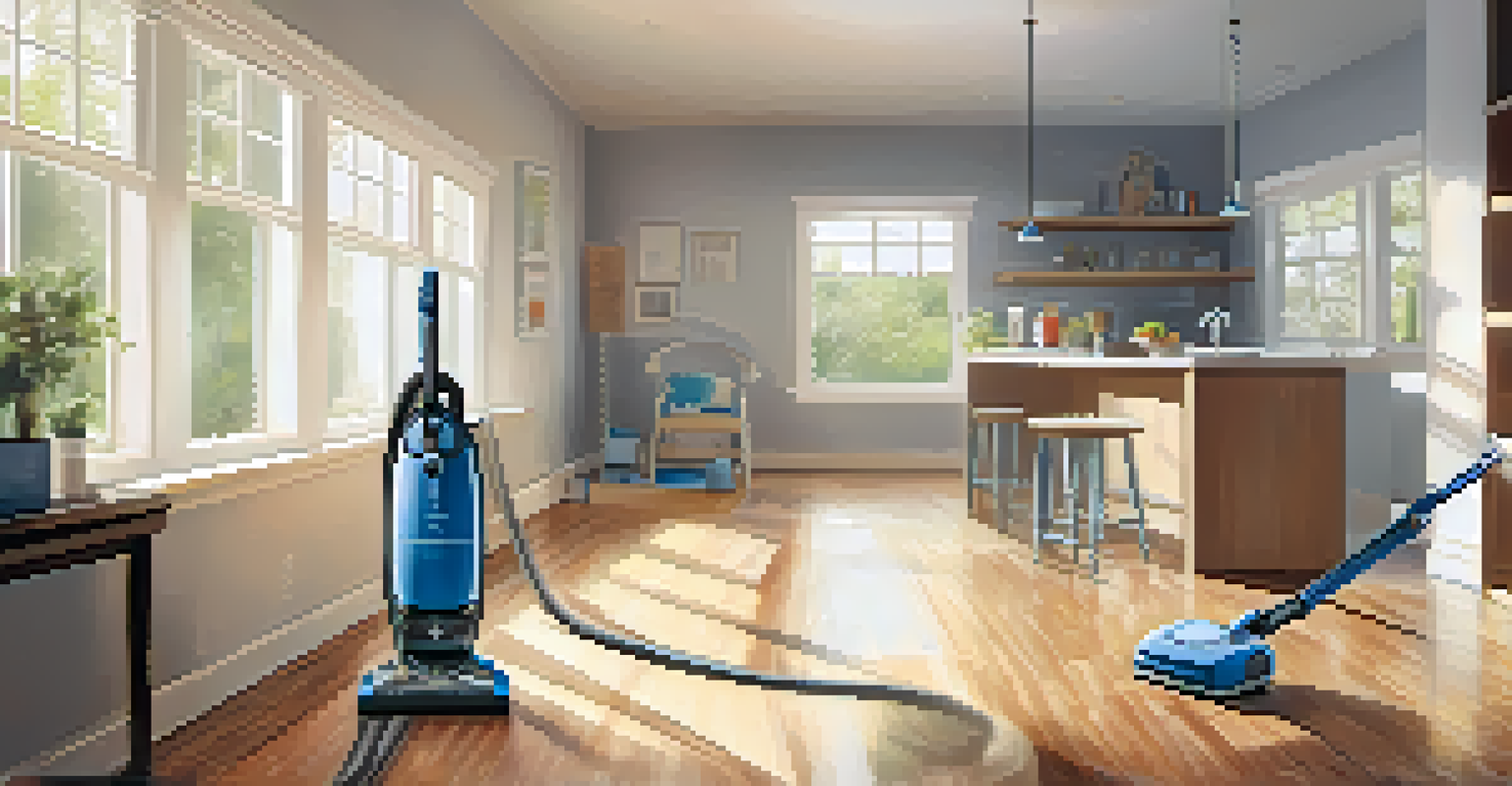Home Maintenance Checklist: Managing Seasonal Allergies

Understanding Seasonal Allergies and Their Triggers
Seasonal allergies, often caused by pollen from trees, grasses, and weeds, can turn a beautiful day into a sneezing fit. Understanding what triggers your allergies is the first step in managing them effectively. By knowing which allergens are present in different seasons, you can take proactive steps to minimize your exposure.
Allergies are like a bad relationship — you know they're not good for you, but they can be hard to avoid.
Common triggers include not just pollen, but also mold spores and dust mites, which thrive in damp conditions. For example, late spring might bring tree pollen, while late summer could be dominated by ragweed. Keeping track of these changes can help you prepare and respond accordingly.
Identifying your specific triggers can also help you tailor your home maintenance routine. If you know that mold is a major concern for you, for instance, you might want to prioritize cleaning and ventilating areas prone to dampness.
Regular Cleaning: Key to Reducing Indoor Allergens
A clean home is essential for reducing allergens, as dust and other irritants can accumulate quickly. Regular dusting, vacuuming with a HEPA filter, and mopping can significantly cut down on indoor allergens. It’s a bit like keeping a tidy garden; the more you maintain it, the less likely it is to attract pests.

Pay special attention to areas where dust tends to collect, such as under furniture and behind appliances. Don’t forget about soft furnishings and carpets, as they can trap allergens. Incorporating a cleaning schedule can help ensure that these areas receive the attention they need.
Identify Allergy Triggers Early
Understanding specific allergens, such as pollen and mold, can help you take proactive measures to manage seasonal allergies.
For those with severe allergies, consider using an air purifier equipped with a HEPA filter. This can help capture airborne allergens, providing a safer breathing environment, especially during peak allergy seasons.
Seasonal HVAC Maintenance for Better Air Quality
Your HVAC system plays a crucial role in maintaining indoor air quality, especially during allergy season. Regular maintenance, such as changing air filters every few months, can significantly reduce the amount of pollen and dust circulating in your home. Think of it as changing the oil in your car; it keeps everything running smoothly.
The best way to predict your future is to create it — and that includes creating an allergen-free environment.
Additionally, consider scheduling professional HVAC inspections to ensure your system is operating efficiently. This can help identify any potential issues, like mold growth in ducts, which can exacerbate allergic reactions. Just like you wouldn’t ignore a strange noise from your vehicle, regular checks can prevent bigger problems down the line.
Incorporating a whole-house humidifier can also help regulate humidity levels, making it less favorable for mold and dust mites. Aim to keep indoor humidity between 30% and 50% for optimal comfort and health.
Managing Outdoor Spaces to Limit Allergens
Your outdoor spaces can also contribute to seasonal allergies, so it’s essential to manage them wisely. Regular lawn maintenance, including mowing and trimming, can help minimize pollen-producing plants. Think of it as grooming your garden to keep it beautiful and less irritating.
Choosing low-pollen plants is another effective strategy. Native plants often produce less pollen and can attract beneficial insects. Doing a little research before planting can go a long way in creating an allergy-friendly environment.
Regular Cleaning Reduces Allergens
Maintaining a clean home through regular dusting and vacuuming can significantly cut down on indoor allergens.
Also, consider setting up a designated outdoor area with materials that are less likely to collect pollen, like patios or decks. This way, you can enjoy the outdoors without being overwhelmed by allergens.
Creating an Allergy-Friendly Bedroom Sanctuary
Your bedroom should be a sanctuary, especially if you suffer from allergies. Start by investing in allergen-proof mattress and pillow covers. This creates a barrier against dust mites, ensuring a more restful night’s sleep. It’s like wrapping your favorite book in a protective cover to keep it in pristine condition.
Regularly washing bedding in hot water can also help eliminate allergens. Aim for at least once a week to keep dust mites and other irritants at bay. Pair this with frequent vacuuming of carpets and rugs to keep your sleeping space as allergen-free as possible.
Lastly, consider reducing clutter in your bedroom. The more items you have that collect dust, the harder it is to keep the space clean. Simplifying your decor can lead to a more serene space that's easier to maintain.
Using Natural Remedies to Alleviate Symptoms
Alongside home maintenance, natural remedies can help alleviate allergy symptoms. Local honey, for example, is thought to help build immunity against local pollen. While research is still ongoing, many people swear by it as a delicious way to combat seasonal sniffles.
Essential oils like eucalyptus and lavender can also provide relief. Diffusing these oils in your home can help clear nasal passages and promote relaxation. Imagine stepping into your home and being greeted by a calming aroma that makes you feel instantly at ease.
Stay Informed on Pollen Counts
Monitoring local pollen forecasts allows you to plan your activities and minimize exposure to allergens during peak seasons.
However, always consult with a healthcare professional before trying new remedies, especially if you have existing health conditions. What works for one person might not work for another, so it’s essential to find the right balance for your needs.
Staying Informed About Allergy Forecasts
Staying informed about local pollen counts and allergy forecasts can help you prepare for peak seasons. Many weather apps provide this information, allowing you to plan outdoor activities accordingly. It’s a bit like checking the weather before heading out; knowing what to expect can make all the difference.
On days when pollen counts are high, consider keeping windows closed and using air conditioning instead. This helps prevent allergens from entering your home. You can also avoid outdoor activities during peak pollen times, typically early morning or on windy days.

By being proactive and informed, you can significantly reduce your exposure to allergens and enjoy your home to the fullest. This simple habit can lead to a more pleasant living environment, especially during those challenging allergy seasons.